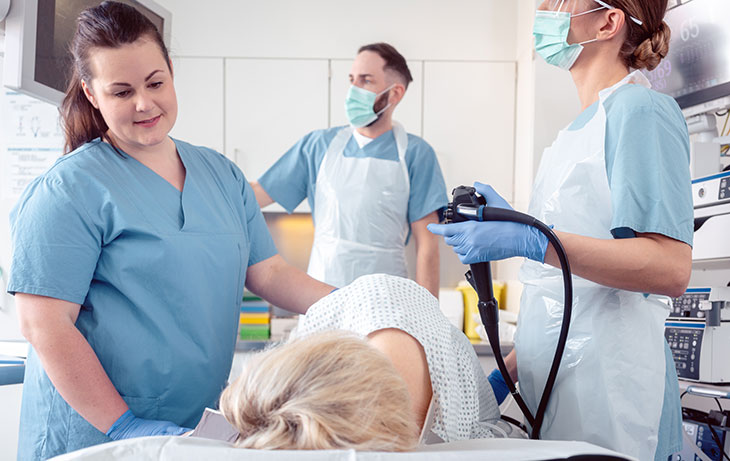
Colorectal (colon) cancer and the need for screenings has been in the news frequently over the past few years. There's also been a rise in colorectal cancer diagnosis in people under the age of 50.
In May 2021, the U.S. Preventative Services Task Force changed its recommendations for people to begin getting colon cancer screenings at age 45 – instead of the previously recommended age of 50.
There are two main types of colon cancer screenings. How do you know which one is right for you?
Our experts offer information to help you make the best decision for your health. Of course, it's always best to consult with your health care provider about your risk for colon cancer and the right type of screening for you.
Learn more about colon cancer symptoms, causes, risk factors, and more
What are the two main types of colon cancer screenings?
A colonoscopy is considered the gold standard for screening. It's the best way to diagnose colon cancer. It allows your provider to directly inspect the inside of your colon, also called your large intestine. During the screening, your provider can also remove any potentially pre-cancerous polyps for further testing.
The other main type is a stool test, which is usually performed with an at-home kit. You typically use a stick or a brush from the test kit to get a small amount of stool into a tube. That's sent to a lab or returned to your health care provider to be analyzed. The stool sample is checked for blood and/or cancer DNA. Blood in your stool is a common sign of precancerous polyps or colon cancer.
Read about other colon cancer screenings from UC Davis Health
Should I have a colonoscopy or do an at-home colon cancer test?
It's best to talk to your health care provider about which form of colon cancer screening is right for you. However, if you are at increased risk of colon cancer, a colonoscopy is likely the best option. It is more accurate in determining the presence of disease.
An at-home test may be a good choice if you are not at increased risk or if you fear sedation, can't take time off work, or encounter other challenges with an in-clinic screening. At-home test kits are quick and effective. However, they can result in false-positive and false-negative results.
No matter which screening you and your provider decide on, something is better than nothing.
See how we provide leading-edge colonoscopy care
How often should I do a colonoscopy or at-home screening for colon cancer?
It's recommended that you have a colonoscopy performed every 10 years, beginning at age 45 and up to age 75. This is the recommendation for people who aren't at increased risk of colon cancer. If you have personal or family history of colon cancer or other cancers, talk to your provider. They may recommend more frequent screenings.
At-home stool tests should be taken every 3 years beginning at age 45 to age 75.
If you are older than 75, talk to your provider about screening. If you are at increased risk of colon cancer, you should also talk to your provider about when to begin screening and how often you should get tested.
What's involved in a colonoscopy?
The day before your colonoscopy, you will need to drink a liquid that empties your bowel. You aren't supposed to eat any solid food, but you can typically drink sports drinks, teas and coffee. Follow your health care provider's instructions for the best results.
Once you're at the provider's office, you will receive a sedation to help you relax, as well as medication to prevent pain. A thin, flexible tube with a camera is inserted into your rectum. It may also have a tool to remove polyps for testing. Most people don't feel any pain but may be a little uncomfortable.
After the test, you are taken to a recovery area until fully awake. You should have a family member or friend drive you home in case you're a little groggy. You are able to eat right away and can return to work the next day.
Learn more about colonoscopy preparation
Do experts know why there's been a rise in colorectal cancer diagnoses in young adults?
People born between 1981-1996 (millennials) are at twice the risk of colon cancer compared to people born in 1950, according to a 2017 study.
Colorectal cancer is also the No. 1 cause of cancer death for men under 50 and the No. 2 cause of cancer death in women in the same age group. Experts aren't sure why there's an uptick in diagnoses. However, it may be partly due to poor diet, use of tobacco and alcohol, and lack of exercise. Genetics may also play a factor, as could chemicals in the environment.
Read more: Colon cancer is on the rise in younger adults – what you should look for
Learn why our cancer center urges early screening as colon cancer rates rise in young adults
This blog was medically reviewed by UC Davis Comprehensive Cancer Center oncologist Rashmi Verma.




